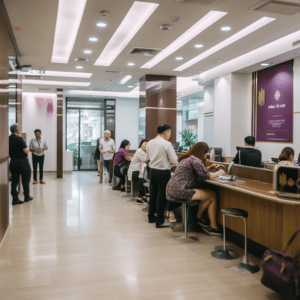In this article, we go look into the best wealth management banks in Thailand that have continuously proven their prowess in safeguarding and expanding the wealth of their clients.
The pursuit of efficient wealth management has never been more important in the fast-paced and ever-changing environment of Thailand’s thriving and ever-changing financial sector.
The selection of the most trusted wealth management bank is of the utmost importance, given that both individuals and businesses are increasingly interested in navigating the difficulties of investment, taxation, and financial planning.
Specifically, we look at the top banks in Thailand which are offering private banking and wealth management.
This guide will assist you in making educated judgments regarding the best wealth management banks in Thailand, regardless of whether you are an experienced investor or a beginner in the world of finance.
If you are looking to invest as an expat or high-net-worth individual, which is what I specialize in, you can email me (advice@adamfayed.com) or WhatsApp (+44-7393-450-837).
In general, we believe superior alternatives exist to the large banks.
We recommend that most wealthy locals and expats in Thailand invest offshore despite this list, and we can help with that.
What are the Best Wealth Management Banks in Thailand?
Bangkok Bank
Bangkok Bank ranks as the sixth largest bank in Southeast Asia. The bank has more assets than any other Thai bank, putting it in first place in Thailand. The bank is also one of the best wealth management banks in Thailand.
Since the company’s founding in 1944, they have been supplying both individuals and organizations with the direction and reassurance it requires to be able to make financially responsible decisions in a global economy that is constantly shifting.

Some of their most notable subsidiaries include Bangkok Bank (China), PT Bank Permata Tbk, Bangkok Bank Berhad, Bualuang Securities, BBL Asset Management, and Bualuang Ventures.
They are a key provider of corporate finance and SME credit, with around 240 business centres and business offices, and have the largest retail client base in Thailand, with approximately 17 million accounts.
They have been able to grow in proportion to the ever-increasing monetary requirements of their vast and committed customer base, which has been a key factor in the company’s remarkable level of commercial success.
Conventional banking services, syndicated loans, debt securities underwriting, trade financing, project finance, custodial services, SME and merchant services, and specialized industry consulting are some of the products and services that they provide for businesses as part of their banking operations.
They provide both their commercial and retail customers with support in the form of a countrywide branch network, phone banking, and a handy, easy-to-use bilingual online and mobile banking platform that enables quick banking around the clock.
They have the largest network of any Thai bank and are considered a pioneer in international banking.
They have international branches in over 300 locations across 14 countries and economies, including Cambodia, China, Hong Kong, Indonesia, Japan, Laos, Malaysia, Myanmar, the Philippines, Singapore, Taiwan, the United Kingdom, the United States, and Vietnam.
Over the course of more than seventy years, their business has been guided by the notion that they should always act as a trustworthy friend and reliable business partner.
This demonstrates their attention to their ESG responsibilities and emphasizes the importance they place on partnering with their customers to develop relationships that can last decades or even generations.
They encourage cutting-edge business techniques, cutting-edge technology, the development of secure digital banking, and cutting-edge innovations to serve the varied requirements of their customers in an effort to make Thailand a better and more sustainable country.
Kasikornbank (KBank)
Kasikorn Bank, formerly recognized as Thai Farmers Bank, is a prominent financial institution in the country.
The founding of the KASIKORNBANK Public Company Limited took place on June 8, 1945, with an initial registered capital of Baht 5 Million and a workforce consisting of merely 21 individuals.
The initial establishment now serves as the primary branch, known as the Thanon Sua Pa Main Branch.
The Bank had a robust performance within a six-month period of its establishment.
As of the conclusion of its initial accounting period on December 31, 1945, the Bank documented total deposits amounting to Baht 12 Million, with assets valued at Baht 15 Million.
Since its establishment, the institution has undergone significant growth and diversification, ultimately becoming one of the best banks in Thailand.
Kasikorn Bank provides a diverse array of services to its clientele, encompassing personal and business banking, foreign exchange, as well as trade banking.
Widely known as “KBank” in colloquial terms, this financial institution has a vast presence in Thailand with a network of over 800 branches and a comprehensive distribution of ATMs spanning both rural and urban regions.
In addition to its traditional banking services, Kasikorn Bank offers digital banking solutions, including online and mobile banking platforms, to cater to the needs of its clientele.
Over the course of the past seven decades, the Bank has consistently endeavoured to enhance our organizational growth and provide financial product initiatives, along with exceptional service delivery, in alignment with our motto, “Towards Service Excellence.”
Siam Commercial Bank (SCB)
Siam Commercial Bank (SCB) is widely acknowledged as the first bank in Thailand, and it is frequently marketed in this capacity.
Siam Commercial Bank (SCB) also maintains the distinction of being the largest bank in Thailand according to certain measures.
Two years prior to gaining its formal license from King Chulalongkorn (Rama V) in 1906, the bank, which was formerly known as “Book Club,” was initially established as a private trust by Prince Mahisara Rajaharudaya, who was the brother of King Chulalongkorn (Rama V).
Prince Mahisara Rajaharudaya is often referred to as the “Father of Thai Banking” due to his prominent role in the growth of the banking industry in Thailand and is largely regarded as the industry’s founding father.
The Siam Commercial Bank (SCB) was first created with the primary intention of providing banking services to merchants and traders in Thailand.
Subsequently, SCB has developed into a significant financial organization.
Corporate and retail banking, investment banking, asset management, and insurance are some of the services that are included in the organization’s menu of offerings to customers.
As a result of SCB’s extended track record of providing dependable financial services to its clientele, the institution enjoys great prominence within the context of Thailand’s broader economic environment.
Krungthai Bank
Krungthai Bank, also referred to as KTB is a financial institution owned by the state, which was founded in the year 1966. The Ministry of Finance of Thailand holds the largest interest in the corporation.
KTB, boasting a network of almost 900 branches across Thailand, holds a prominent position as one of the leading commercial banks in the country.

Furthermore, it is noteworthy that this particular corporation holds the distinction of being the inaugural state-owned enterprise to undergo the process of initial public offering and thereafter be listed on the Stock Exchange of Thailand.
Krungthai Bank offers a range of essential financial services, including the facilitation of savings accounts, the provision of loans, and the issuance of credit cards.
The bank provides its clientele with the option to conduct financial transactions from a distance, through mobile devices, or a combination of both.
With that being stated, engaging in business transactions with a government-owned bank can often provide challenges for an international investor.
It is strongly advised that individuals who are not local residents or lack a significant cause to conduct banking activities at KTB consider opting for an alternative financial institution from the provided list.
TMB Bank
The financial institution previously referred to as the Thai Military Bank (TMB) has undergone a name change and is now recognized as TMB Thanachat Bank (TTB).
The rebranding occurred subsequent to the successful merger between TMB and Thanachat Bank.
Originally established to meet the financial needs of the Royal Thai Armed Forces, this institution has subsequently evolved into a prominent commercial bank in Thailand, serving both civilian and military clientele.
TMB offers a range of financial services to its clientele, including retail banking, business banking, investment banking, and wealth management.
The organization is presently expanding its international presence by establishing additional branches in various countries, resulting in a cumulative count of over 600 sites in Thailand.
CIMB Thai Bank
CIMB is the second largest foreign-owned bank in Thailand. Due to Maybank’s departure, it is now the only Malaysian financial institution still operating in Thailand.
CIMB promotes itself as an “ASEAN Bank” because its operations are prevalent in all of the major Southeast Asian nations.
If you only have a tourist visa, however, opening an account at any of their locations will be exceedingly difficult.
Notably, CIMB has eliminated all of its automated teller machines (ATMs) in Thailand and is now marketing itself as a 100 percent digital bank.
Because of this, it is no longer free to use your CIMB card outside of Thailand to withdraw money from an ATM.
UOB Thailand
United Overseas Bank (UOB), a Singapore-based multinational business, has the position of the third largest bank in the Southeast Asian region.
In comparison to the other banks included in this list, UOB exhibits a considerably larger global network of activities.
The automated teller machines (ATMs) of the organization are geographically dispersed throughout the entirety of the Asian continent, spanning from Hong Kong to Indonesia.
For those engaged in regular commercial activities across multiple Asian nations, it is advisable to explore the possibility of establishing an account with UOB.
In the year 2023, UOB emerged as the preeminent foreign-owned financial institution in Thailand following the successful acquisition of Citibank’s unit in the country. Moreover, we contend that it is the most superior in all aspects.
Standard Chartered Bank Thailand
Standard Chartered Thailand, alternatively referred to as Standard Chartered Bank (Thai) PCL, operates as a subordinate entity of Standard Chartered, offering a range of banking and financial services under the jurisdiction of Thailand.
The official name of the bank is Standard Chartered Bank (Thai) Public Company Limited. The company serves customers within the wholesale banking industry.
Standard Chartered Bank has maintained a presence in Thailand since 1894, when the Chartered Bank of India, Australia, and China established a branch in Bangkok.
In the past, the financial institution was recognized under the name of the Chartered Bank of India, Australia, and China.
In 1999, Standard Chartered made a payment of 12.377 billion baht, approximately equivalent to £193 million, to acquire a 75% stake in Nakornthon Bank, a financial institution based in Thailand.
The Financial Institutions Development Fund, which was founded by the Bank of Thailand, holds approximately twenty-five percent of the company’s shares.

The recent recapitalization of Nakornthon, amounting to about seven billion baht or around 109 million pounds, can be attributed to this fund’s responsibility.
The financial institution presently recognized as Nakornthon Bank was initially established in 1933 under the name Wang Lee Chan Bank.
The bank underwent a name change in 1985, resulting in its new designation as Nakornthon Bank. After the conclusion of the transaction, Standard Chartered undertook the process of rebranding the financial institution, resulting in its new name as the Standard Chartered Nakornthon Bank.
At the time of the deal, the Nakornthon Bank, which possessed a total of 67 domestic branches, held the distinction of being the second oldest bank in Thailand.
In terms of asset size, this particular Thai commercial bank is ranked twelfth out of a total of thirteen banks, with approximately one billion pounds worth of assets.
In 2005, Standard Chartered underwent a merger process wherein its Bangkok branch was integrated into Standard Chartered Nakornthon Bank.
Consequently, the resulting entity was named Standard Chartered Bank (Thai) PCL.
Deutsche Bank Thailand
The beginning of Deutsche Bank’s presence in Thailand may be traced back to 1906 when its predecessor, German, Asian Bank, acquired a stake in Siam Commercial Bank.
In the year 1978, the bank inaugurated its initial satellite branch, a development made possible through its then-affiliate, the European Asian Bank, which it subsequently obtained complete ownership over.
Deutsche Bank has consistently upheld its establishment in Thailand over many political and economic fluctuations, presently employing around 130 permanent personnel in the region.
The Deutsche Bank, Bangkok Branch is set to commemorate its 45th year of establishment in Thailand through a commemorative event scheduled for the year 2023.
Final Thoughts
The wealth management sector in Thailand exhibits a wide range of financial institutions, characterized by their distinct attributes that serve the requirements of affluent clientele.
While numerous financial institutions have exhibited exceptional performance in their services, it is imperative for individuals seeking wealth management solutions to engage in comprehensive research, evaluate their individual financial objectives, and meticulously evaluate the distinct offers and skills of these establishments.
Your choice among the best wealth management banks in Thailand is contingent upon your unique circumstances, preferences, and financial needs. Investment funds in any of these institutions might be deemed as a highly favourable investment opportunity.
Investors can effectively navigate the intricate landscape of the financial realm and ensure a profitable future by making well-informed decisions and engaging in close collaboration with seasoned wealth advisors.
Pained by financial indecision?

Adam is an internationally recognised author on financial matters with over 830million answer views on Quora, a widely sold book on Amazon, and a contributor on Forbes.



